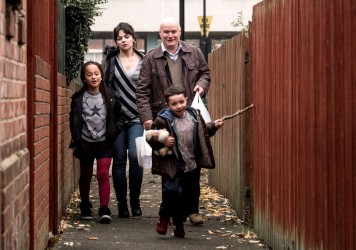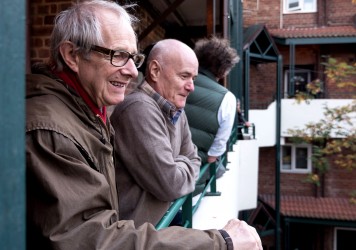In what could be his final film, Ken Loach fixes his gaze on a pub landlord in a town reckoning with a new population of Syrian refugees.
In Which Side Are You On?, his 1984 documentary on the miners’ strike, Ken Loach focuses on the public spaces, the clubs and halls, where the miners and their family gathered, and the community culture they shared there: the stories they told, poems they recited, songs they sang, and family meals they served to all who were hungry. It’s a rosy, adoring view of pubs and clubs as explicitly, perfectly Marxist – a coal country – accented chorus rising in a single voice to inspire us all to a more perfect union.
Loach returns to one such space in The Old Oak, named for a local pub somewhere in “The North of England” (no location is specified, but the film was shot around Durham). The place is atrophied, with houses selling for four figures, the social safety net threadbare, and the remaining locals embittered; the film is the 86-year-old Loach’s expression of despair and desperate hope over the fate of his treasured Northern working class, perhaps lost forever to nativism and racist grievance.
Set in 2016 – Brexit is never explicitly mentioned – the film begins with a few Syrian families of resettling in a failing former mining town; the refugees are quickly showered with invective of the go-back-to-where-you-came-from variety, and one local yob smashes the camera belonging to Yara (played by Yara Ebla Mari, who teaches theater to young children in her native Golan Heights and makes her screen debut in a role inspired by conversations with Syrian refugees in Britain). The Old Oak is the town center, and rotting. The “K” in the sign is askew, the varnish is blistering on the dark old wooden walls, and the back room and kitchen hasn’t been open in years.
The old miners—or miners’ sons, anyway—gather their every day to remember and remonstrate about the state of things, and grow quickly suspicious and sarcastic over the new arrivals to “their pub.” Landlord T.J. (Dave Turner) is the movie’s moral center, but a curiously enervated one, who mostly goes along to get along and is wrecked by life circumstances which he duly reveals in a sad monologue. (It involves the surreally maudlin sudden appearance of a stray dog delivering him from suicidal depression.)
In their recent collaborations, Loach and his regular screenwriter Paul Laverty are scrupulous in tying their drama to contemporary social problems, a variation on everyone-has-their-reasons humanism in which all character motivations tie neatly back to something you’ve read about in the news and every scene hinges on the real-world consequences of a recent government policy decision.

The lads at the pub have been primed to be upset about the holding companies buying up houses in the neighborhood and renting out poorly maintained properties to struggling and erratic tenants (as they discuss, in the pub); the single mum who yells at Yara for looking after her daughter at sports day and intruding on her life is ashamed to not have food in the house (as she more or less explains in apology); the schoolkids who beat up one of their Syrian classmates view the new arrivals as queue-jumpers and ingrates (as evidenced by one local boy’s jealousy when a refugee rides past on a donated bike).
Loach’s plug-and-play style goes back a half-century now, all the way to Kes and his kitchen-sink television dramas, and it’s been intriguing to watch his project evolve with the times, even as he’s become more and more tiresomely specific about it, having his characters explicitly describe their material circumstances—everyone is a ventriloquist’s dummy for the attitudes and talking points of a recognizable sociological type, in ways that are impossible to miss. Scenes fade to black exactly as soon as the point has been made.
The point being made in The Old Oak is twofold. On the one hand, there is the tragedy of the hollowed-out northern working class taught hatred and resentment by the very bosses they once fought against, manifest in the Old Oak regulars, whose banter and Facebook posts grow increasingly racist Facebook (Loach’s approximations of online hate speech are very cringey), and whose behavior grows unnecessarily personal and gratuitously villainous.
On the other hand is the importance of bearing witness and remembering, and the possibility of regenerating. Yara shows T.J. photos of her family in Syria, and explains their heartrending tragedies; T.J. takes Yara back to the back room, and explains the significance of all the old photographs of the miner’s strike (lest we forget). This gives Yara the idea to reopen the back room for community kitchen like in the strike days, in explicit homage and continuation of the time when everyone was pulling together. (“It’s not charity, it’s solidary,” T.J. explains in voiceover, to no one in particular.)
Loach’s films are rigidly programmatic, with didactic intent made persuasive with reliably on-the-nose sentiment, a human face for stories you know, inevitably touching on themes of profound human need. He has a political project he can’t leave alone; it’s both inspiring and irritating to see him continue to work out exactly what to think about modern Britain. The Old Oak will be his final film, he has said, though he’s said that before; as long as there’s austerity in Britain he’ll be there, like Tom Joad – or anyway for at least as long as he can, like a frail radical professor with a bullhorn rallying protestors young enough to be his grandchildren.
If this really is Loach’s last film, that perhaps explains some of the wild oscillations in tone, the anxious heavy-handedness, the desperate rationalizations. An emotionally febrile film despite its blocky writing and very stilted performances, The Old Oak is at times overcome with something like nihilism at what’s become of the project and people in which Loach has invested so much of himself; every time T.J. seems ready to give up, though, Yara or another character pops up to give a speech about hope (she also remembers to throw in a plea for greater foreign intervention against the Assad regime).
Hope is an act of faith in defiance of despair—this is all pretty much just dialogue in the film, as well as its obvious theme—and Loach leaves the field of battle having more or less convinced himself that the struggle for the human dignity of migrants is the route to a new, newly intersectional solidarity.
The Old Oak ends with a march, like the one at the climax/conclusion of Which Side Are You On?, with a sea of people, banners, music, slogans, community and conviction. “For all the good that did,” we might say from the vantage of nearly 40 years since Which Side Are You On? came, but really, even knowing what we know about the future would go, what should anyone have done any differently? That monotonous sound you hear is Loach hitting the nail on the head, again and again, with the same hammer he’s been wielding for 50 years. Will you be relieved when it finally stops, or will you worry about who, if anyone, will be there to take up the hammer in his stead?
Little White Lies is committed to championing great movies and the talented people who make them.
Published 25 Sep 2023
Is Ken Loach modern cinema’s answer to John Steinbeck? Let’s see…
Another heavy-handed late work which trades largely on didacticism and sentimentality.
Not without its moments, but you’d do best to visit some of Loach’s early, really angry ones.

Ken Loach doubles down on his kitchen-sink shtick in this heavy-handed indictment of Britain’s gig economy.

Ken Loach’s latest polemic has a vital message that’s diluted by some heavy-handed direction.

The director was correct in chastising the “fake nostalgia” of period dramas.